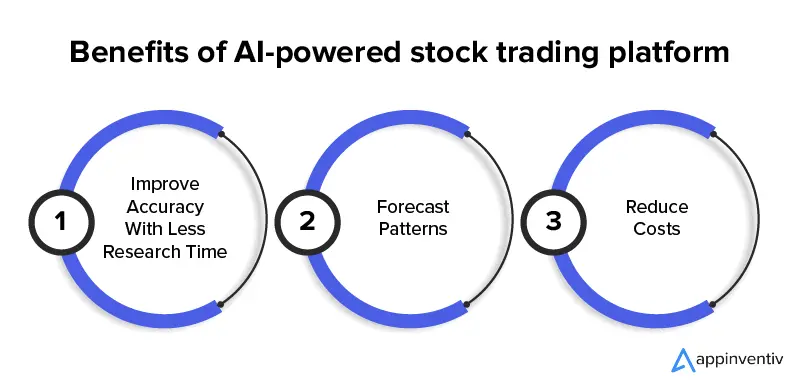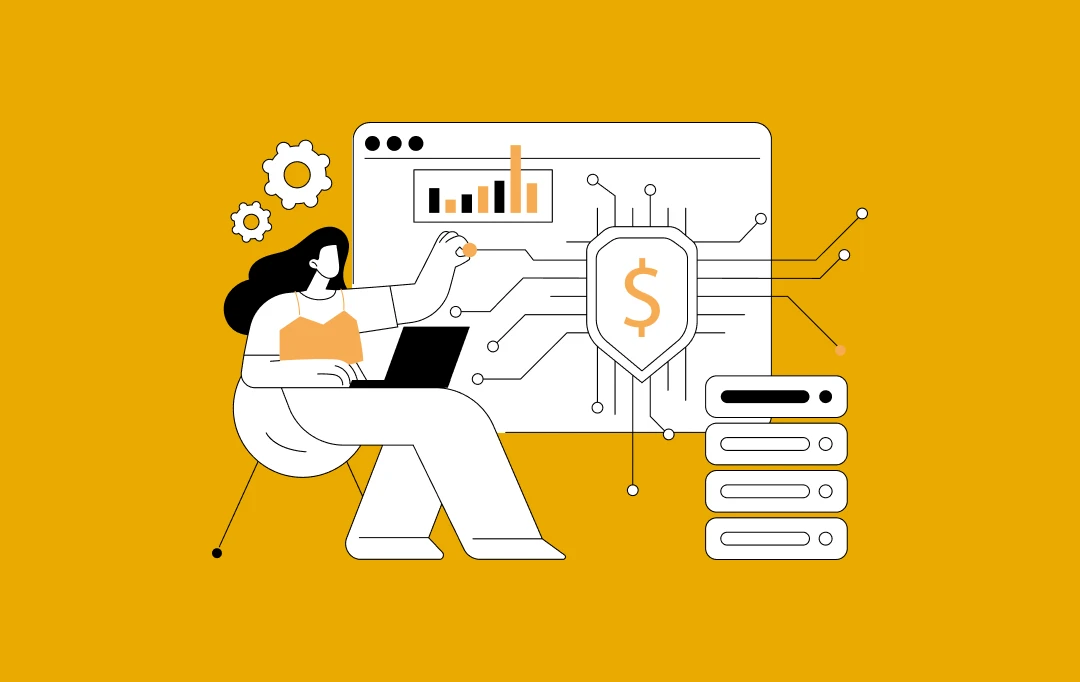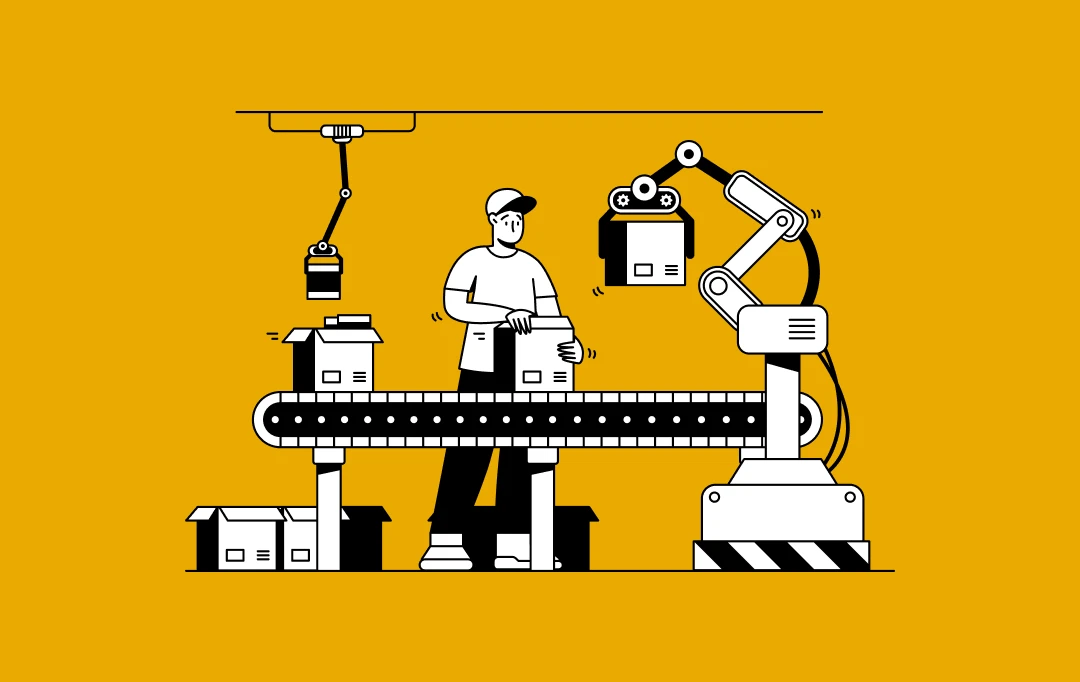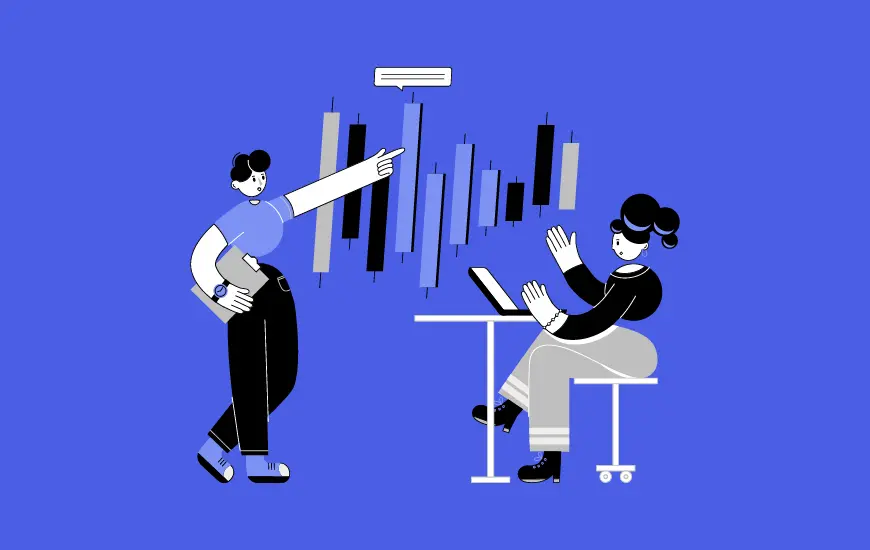- How Artificial Intelligence Transforms Stock Trading?
- How Artificial Intelligence Stock Trading Works?
- What Are AI Trading Signals In AI-powered Stock Trading?
- Benefits of AI in Stock Trading
- Improve Accuracy With Less Research Time.
- Forecast Patterns
- Reduce Costs
- Human Stock Trading vs. AI Stock Trading- Key Differences
- Human Emotions Involvement
- Follow Rules
- Consistent Trading Ability
- The Capability Of Monitoring Considerable Markets
- Types of AI Trading Techniques
- AI Use Cases in Stock Trading
- Designing Stock Algorithms
- Designing Customer Service Bots
- Risks of AI Trading
- Conclusion
- FAQ’s
It is no secret that the stock market is one of the most promising methods of generating wealth. However, to succeed in the stock markets is not everybody’s cup of tea. All of us have heard the stories where on one hand, investors have made millions of dollars overnight and, on the other, have lost all of their wealth in a similar timeframe.
In such a predicament, how does one safeguard their portfolio and get the best returns on their investments?
Enter AI in stock trading.
Presenting an evermore lucrative opportunity to seasoned investors and newcomers alike, AI in stock trading is all set to revolutionize how we trade, in turn growing wealth exponentially.
This article explores the pros and cons of using AI in stock trading while providing practical tips for individuals without technical expertise who want to profit from these technologies. Additionally, we examine possible drawbacks related to solely depending on AI decision-making techniques and shed light on its limitations when predicting market outcomes accurately.
How Artificial Intelligence Transforms Stock Trading?
With unmatched computational capabilities and intelligent decision-making skills based on vast quantities of information sets, the role of AI in stock trading has unlocked new potentials for optimizing trade margins further quickly than conventional methods ever could provide. In the world’s dynamic stock markets, where time can be a rare asset to many traders or investors, AI for trading, even in the form of a stock trading app, helps capture profitable opportunities while minimizing risks simultaneously. Financial firms can get valuable insights into complex trading opportunities that support real-time buy and sell decisions by analyzing stock prices continuously and processing massive amounts of unstructured data.
How Artificial Intelligence Stock Trading Works?
The combination of AI and stock trading remains one of the most innovative disruptions available today, allowing investors access to large quantities of financial information to operate better-informed investments. Now, to answer your question- how to use AI in investment and stock trading look at the systematic process below:
- Data Collection: Data ranging from historical price trends to macroeconomic indicators, which include news articles, social media sentiment, etcetera, can be aggregated quickly by using AI to trade stocks systems from different sources related to finance
- Data Preprocessing: Data collected needs cleaning, thus ridding it of errors and making it properly organized with missing values filled in so it associates well with other components neatly arranged
- Feature Extraction: Employing sophisticated algorithms helps establish valid indicators that have resulted in stock fluctuation over prolonged periods. Features such as P/E ratios, volume, and moving average. Sentiment scores form just a fraction of the many features that may be extracted.
- Model Training: Machine learning algorithms undergo training with previously collected historical data to identify relationships and patterns between extracted features and stock price movements, thereby providing predictions on likely future tendencies.
- Decision Making: Through predictions generated by trained AI models analyzing real-time or historical data, insights are provided on holding, selling, or buying a particular stock which is refined concurrently upon market trends, risk tolerance as well as the investor’s objectives.
- Execution: Recommendations from trained AI Models can automatically be executed directly via brokerage platforms or human traders who could also provide reliable recommendations.
- Monitoring & Adaptation: Continuous monitoring affords precise performance tracking for efficiency appraisal via predictions tracking where mistakes encountered through the algorithm can be corrected while adapting models over time in response to changing market conditions with increased accuracy of assessing statistics based on previous performance response rates gathered. It’s pertinent for investors to recognize that AI stock trading system structures present both opportunities and hazards. These models are only somewhat reliable as unpredictable market fluctuations or discrepancies in data accuracy could lead to inaccurate predictions.
Also read: How Much Does Robinhood Like Trading App Development Costs?
What Are AI Trading Signals In AI-powered Stock Trading?
The amalgamation of AI and stock trading has great potential value – namely, the ability to generate insightful trading signals. These signals result from sophisticated big data analyses performed by AI systems on specific financial assets; they offer investors accurate recommendations on actions to achieve successful trades. The guidance may include advice regarding the timing and pricing of entry or exit points and ideal stop-loss thresholds intended to improve asset risk management performance – keeping traders from falling too far below their desired profitability level amid hopes that prices will recover.
Trading signals are produced using AI algorithms that examine various crucial indicators ranging from price action and currency valuation to deep dives into news stealing affecting particular assets – even analyzing social media data for additional insight into market sentiment – while incorporating advanced technical analyses on stock-price fluctuations within datasets. Accessing these coveted AI-driven trading signals typically will require engaging with specialized firms since most companies maintain secrecy around their cutting-edge real-time stock-market analysis software, preferring subscription-based models instead.
Benefits of AI in Stock Trading

AI for trading offers several benefits, including
Improve Accuracy With Less Research Time.
By automating research processes and employing data-driven strategies through AI-powered algorithms in their trade executions, investors can effectively save time while easily overseeing their transactions, alongside providing expert advice for their clients effortlessly.
A recent study suggests that employing algorithmic techniques may increase productivity by as much as an impressive 10%. What’s more? Using historical financial figures enhances the quality of guidance provided significantly, thus improving both accuracy levels while reducing the likelihood of any margin for errors that might arise due to human involvement during trade executions.
Forecast Patterns
Through the implementation of sentiment analysis, AI-powered stock trading can collect various textual and linguistic aspects to identify patterns lying within objective material. AI solutions in stock trading systems can determine distinctive market swings and fluctuations by analyzing and examining news outlets and social media platforms.
Reduce Costs
Traditional investment organizations often hire an extensive team comprising multiple brokers, analysts, and advisors to run their operations. However, incorporating modernized technology like AI solutions in stock trading can automate some tasks that may be repetitive for their human workforce. Even though there may be initial economic implications associated with implementing this new system along with its maintenance costs, organizations, and investors can significantly reduce overhead expenses over time by employing it.
Besides being cost-effective over the long haul, the upside is that AI algorithms are programmed to work consistently without any breaks ensuring uninterrupted monitoring of stock markets 24/7.
Human Stock Trading vs. AI Stock Trading- Key Differences
A comparison of AI-driven stock trading versus traditional human-led approaches shows clear differences between the two methods. Using AI-facilitated techniques allows traders to deal with multiple markets simultaneously by remaining disciplined throughout their operations.
Conversely, human-led strategies present several challenges that hinder successful trades, including psychological barriers, breaking pre-established guidelines, and an inability to keep constant tabs on market developments – among other hurdles.
Appreciating how automation transforms the way traders approach investing yields benefits for all. Here are the key difference between both stock trading methods.
Human Emotions Involvement
Automated trading offers an edge to market participants by eliminating the impact of irrational human emotions that could confuse judgment and result in poor investment decisions. Conversely, human traders who experience losses may fall prey to negative psychological biases that disturb their performance.
Strong psychological capabilities are necessary for those looking to succeed as traders because unmanaged emotions pose significant obstacles – particularly when dealing with challenges like overtrading or engaging in revenge-motivated behaviors contrary to sound investment principles.
Follow Rules
When it comes to trading, artificial intelligence leverages different metrics like indicators, price fluctuations, or specific principles defined by traders and investors.
Unlike human traders, AI is not influenced by emotions but processes data objectively. Immutable in its strategy execution without any irregularities ensures its long-term success in trading markets, especially because it never breaks established rules.
Conversely, new traders may deviate from their system’s principles and impulsively take unsustainable trades when unable to identify suitable ones initially, leading to recurring losses.
Consistent Trading Ability
Constant market tracking is not viable for humans, but it can be achieved by trading software. Trading software that operates continuously can find and execute every market move, thus increasing profitability.
The Capability Of Monitoring Considerable Markets
Markets such as cryptocurrencies, forex, stocks, and others offer a diverse range of tradeable assets that require systematic observation to identify profitable trading chances. Nevertheless, managing multiple markets can be challenging for humans as keeping track of every move in multiple tradeable assets becomes daunting.
Types of AI Trading Techniques
AI stock trading has significantly revolutionized the way the market operates. It has introduced unprecedented levels of efficiency and insight that were once not imaginable at all. Through the automation of intricate decision-making processes, AI has improved the speed and precision of trading activities. Let’s explore some of the key AI trading techniques that are transforming the financial landscape.
Data Mining: This technique involves the comprehensive analysis of massive datasets to identify hidden patterns and trends that are not immediately obvious. AI enhances data mining in stock trading by enabling faster processing and more complex analysis, allowing traders to uncover profitable opportunities based on historical data patterns.
Predictive Modeling: AI uses advanced algorithms to analyze historical data and predict future market trends. This technique helps traders to anticipate market movements and make informed decisions. Predictive modeling can improve the accuracy of forecasts and help in developing strategies that align with projected market scenarios.
Sentiment Analysis: It is an AI trading technique that uses natural language processing (NLP) to analyze public sentiment from various online sources such as news articles, social media platforms, and financial blogs. This technique helps traders understand the public’s feelings and opinions about specific stocks or the market as a whole.
[Also Read: Harnessing the Power of AI Sentiment Analysis – 10 Benefits and Use Cases for Businesses]
Risk Modeling: Through risk modeling, AI assesses the potential outcomes and risks associated with different trading strategies. It uses historical data to simulate various market conditions and predict the impact on investment portfolios. This allows traders to understand potential risks and tailor their investment strategies to mitigate losses.
Stress Testing: AI-driven stress testing involves applying various hypothetical scenarios to determine how an investment strategy holds up under extreme market conditions. This method is crucial for identifying vulnerabilities in investment strategies and helps in refining them to ensure robustness against market downturns.
Real-Time Analysis: AI excels in processing vast amounts of data in real time, which is crucial for stock trading where market conditions can change rapidly. By utilizing real-time analysis, traders can instantly react to market movements, adjust their strategies on the fly, and capitalize on short-term events before they become common knowledge.
Backtesting: Backtesting with AI involves applying trading strategies to historical data to evaluate their effectiveness before deploying them in live markets. This provides insights into how a strategy would have performed in the past, allowing traders to fine-tune their approaches based on solid empirical evidence.
Benchmarking: In benchmarking, AI compares the performance of specific trading strategies against established market benchmarks or indexes. This is critical for evaluating the relative success of a strategy and understanding how it stands in comparison to broader market movements. Benchmarking helps traders adjust their strategies to achieve superior performance.
AI Use Cases in Stock Trading
There are numerous use cases of AI in stock market; here are the top AI in stock trading examples:
Designing Stock Algorithms
For those interested in optimizing their trading techniques for stocks. Incorporating artificial intelligence has become a popular strategy by leveraging sophisticated platforms that integrate deep learning technologies with real-time market analysis data. Users can design unique AI-based stock trading algorithms that execute trades automatically without human intervention.
The benefits here are twofold – profits are maximized because of speedy decision-making. At the same time, time is saved since there’s no requirement for a supervisor to supervise the changing market conditions throughout the day constantly.
Designing Customer Service Bots
Customer satisfaction remains at an all-time high thanks to the integration of AI-enabled trading in customer support services. Investors have access to amazing functionalities through advanced bot systems that cater to managing their portfolios optimally while providing reliable advice on market trends and stock price queries without waiting times delays often found with traditional human support teams.
This automation-based approach promotes efficient workflows within organizations freeing up human operators’ time appropriately, which they can now dedicate to tackling intricate problems. Using chatbots and voice assistants integrated with other complex AI technology ensures a full suite of services for clients that include multiple interaction methods at their convenience, making their experience seamless.
Risks of AI Trading
While AI stock trading offers numerous advantages, it also comes with certain risks that need to be carefully managed:
Systemic Vulnerabilities: When many traders rely heavily on similar AI systems, the market could become more susceptible to cascading issues. A single glitch could potentially impact the entire system, amplifying even minor errors.
Data Security Concerns: With AI, a massive amount of sensitive data is always in use. This raises significant privacy and security risks, as data breaches could expose strategic trading information.
Regulatory Hurdles: Staying on top of regulatory compliance is crucial and sometimes tricky with AI. Automated systems must be continuously updated to comply with new financial laws, which can vary across different regions.
Market Manipulation: There’s a risk that AI systems could be used to create false market trends or manipulate market conditions to the advantage of certain parties, which could undermine market integrity.
Overfitting Models: AI models often excel on historical data due to being overly tailored to past events, a concept referred to as overfitting. However, this can result in poor performance in live trading scenarios, as the model may struggle to adjust to unexpected market conditions.
It’s important for businesses using AI stock trading to be aware of these risks and to implement measures to mitigate them, ensuring that their trading strategies are both resilient and compliant.
Conclusion
The world of stock markets is currently undergoing a significant technological shift, with the rise of artificial intelligence (AI). As a generative AI development company, we understand the transformative potential of AI in stock trading. AI for stock trading is incredibly accurate in its predictions while also delivering streamlined efficiency and cost savings compared to traditional methods. However, it’s crucial to be aware of the potential downsides of relying solely on AI solutions in stock trading. However, it is also important to maintain a balance between AI technology and human assessment. The blend of these two intelligence methods is highly effective for market adaptation and successful trading results.
Appinventiv is a renowned AI software development services company that specializes in creative predictive AI products fine-tuned for the financial market. While being an award-winning fintech software development company enables us to develop feature-rich FinTech software that will help you unlock the maximum value for your and your customers.
FAQ’s
Q. What is an AI trading system?
A. AI trading systems are powerful tools that use state-of-the-art technology, such as machine learning to analyze huge datasets, enabling them to make well-informed decisions on executing trades. It improves decision-making processes along with boosting efficiency through the detection of patterns and generation of trading signals. AI trading systems are capable of providing sophisticated solutions based on an analysis of past data as well as the present market trends to assist in buying/selling stocks or maintaining them for the future
Q. How to build a stock trading AI?
A. Building an AI stock trading app is challenging, as it requires a proper execution plan.
- Gather large sets of important data, including historical price movements, financial statements, news articles, and social media sentiment.
- Process and refine the data for analysis purposes.
- Employ machine learning techniques to predict stock price patterns accurately.
- Integrate the AI system into a trading platform.
- Monitor and improve the AI system’s performance over time.
Q. How will AI affect stock trading?
A. The potential impact of AI on stock trading is immense. With its ability to analyze massive amounts of data quickly and accurately, AI has the potential to enhance predictions and trading strategies significantly. By utilizing its proficiency in identifying complex patterns that humans can miss, AI can provide traders with valuable market insights that lead to informed decision-making. Furthermore, using AI to trade stocks introduces a level of precision and speed unattainable by human traders alone. Additionally, AI-driven systems have the advantage of eliminating human biases and emotions for more objective trading approaches.
Despite these benefits, it’s essential to recognize that while AI in stock trading may offer many advantages, it still requires human monitoring to adapt to ever-changing market conditions effectively and mitigate potential risks. In the context of AI for stock trading, this human oversight ensures that the strategies and decisions driven by AI are constantly evaluated against real-world outcomes and market shifts.



How Much Does it Cost to Build a Custom AI-based Accounting Software?
The accounting industry has been evolving very fast, and the expanding use of AI in accounting is becoming evident. According to The State of AI in Accounting Report 2024, 71% of accounting professionals believe that artificial intelligence in accounting is substantial. Considering the given number, it is easy to grasp why companies are keen on…

Generative AI in Manufacturing: 10 Popular Use-Cases
Introduction Manufacturing is truly getting a serious makeover for the future, and it's not full of buzzwords and techno-speak; with the dawning of AI technologies, manufacturing is no longer about nuts and bolts and conveyor belts. Yes! We are talking about how Generative AI in manufacturing is transforming the entire industry. It was the next…









